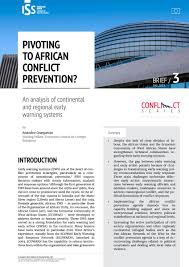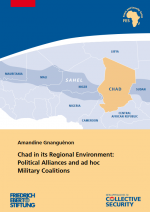Pivoting to African Conflict Prevention? An Analysis of Continental and Regional Early Warning Systems

Despite the lack of clear division of labour, the African Union and the Economic Community of West African States have strengthened technical collaboration regarding their early warning systems.
However, the gap between early warning and early action persists because of challenges in transforming early warning policy recommendations into early response. Three main challenges undermine effective early action: unsystematic interactions between early warning officials and decision-makers, inadequate resources to address transregional conflict, and the political dimensions of conflict responses.
Implementing the African conflict prevention agenda depends less on capacity-building support and more on interpersonal relations between political stakeholders at national and regional levels.
Increasing the active participation of civil society organisations and other regional/ continental collegial bodies such as the Pan-African Network of the Wise in the conflict prevention agenda is a way of circumventing challenges related to political constraints and dealing with local risks of violence.

